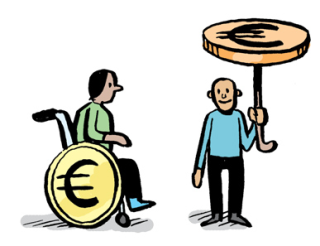Ill and Disabled Face Highest Risk of Poverty

Our recent publication Poverty Focus 2022 analysed the contribution that increases to welfare payments and supports have made to recent reductions in the headline poverty risk measure.
The group in Irish society with the highest risk of poverty are those who are unable to work due to long‐term illness or disability. The latest SILC data report that 39.1 per cent of this group experience poverty. This group’s at risk of poverty rate is eight times that of workers, three times that of the retired and three times that of children.
Over time, the situation of this group has notably varied; much like that for older people. Their risk of poverty climbed from approximately three out of every ten persons in 1994 (29.5 per cent) to over six out of every ten in 2001 (66.5 per cent) before decreasing to approximately two out of every ten in the period 2008‐2014. The most recent figures, for 2015‐2021, marked another increase. As with other welfare dependent groups, these fluctuations parallel a period where policy first let the value of welfare support payments fall behind wage growth, before ultimately increasing them to catch‐up. It is a cruel and unnecessary cycle. Social Justice Ireland believes that there is an on‐going need for targeted policies to assist this group. Further investment in disability services and grants are essential, and so too is the provision of a weekly cost of disability payment.
Cost of Disability
A Cost of Disability Report by Indecon (2021), commissioned by the Department of Social Protection, provides an estimate of the overall average annual cost of disability for Ireland. The report estimated that this ranges from €9,482 to €11,734 per annum (€180‐€225 per week) with the cost estimates related to the severity of limitation and the type of disability. The report stresses how these estimates are averages across populations of individuals with potentially different needs, different circumstances and different costs. In the context of how policy should respond to these costs, the Indecon report notes that “there is a need for the state to provide supports to individuals with disabilities via a range of supports including income supplements, needs assessed grants and direct service provision”. Social Justice Ireland believes that these new cost estimates highlight the need for a comprehensive policy response. It seems only logical that if people with a disability are to be equal participants in society, the extra costs generated by their disability should not be borne by them alone. Society at large should act to level the playing field by covering those extra but ordinary costs. Doing so would also address the very high poverty rates among this group.

GIVING A VOICE TO THOSE
WHO DON’T HAVE A VOICE
When you support Social Justice Ireland, you are tackling the causes of problems.
Social Justice Ireland believes that it should be a national priority to provide all with sufficient income to live life with dignity. This would require enough income to provide a minimum floor of social and economic resources in such a way as to ensure that no person in Ireland falls below the threshold of social provision necessary to enable him or her to participate in activities that are considered the norm for society generally.
Social Justice Ireland believes that the introduction of a cost of disability allowance to address the poverty and social exclusion of people with a long‐term illness or disability is vital to address the high rates of poverty experienced by this group.
